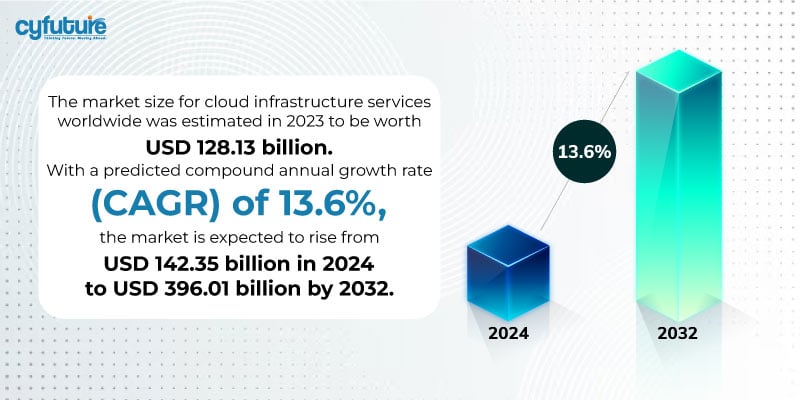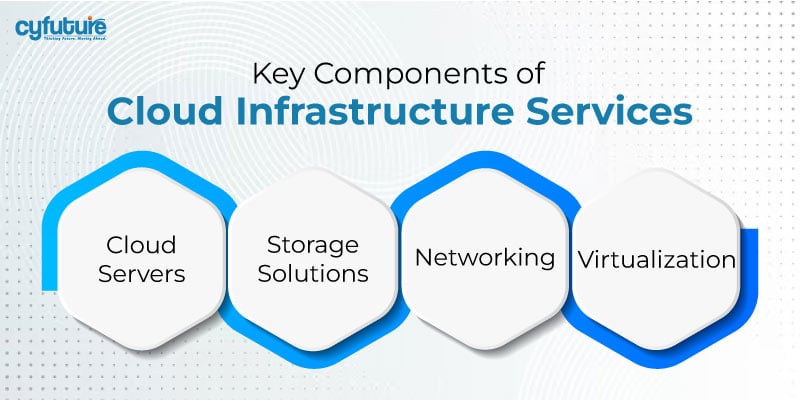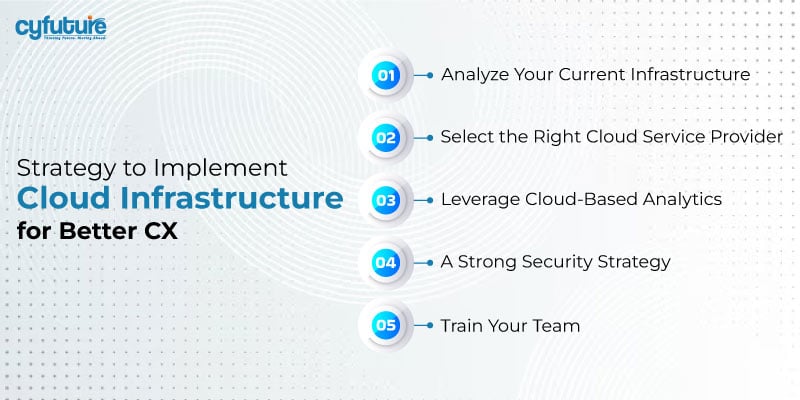-
Get Cloud GPU Server - Register Now!
Toggle navigation

Customer experience has become the cornerstone of business success. Companies continually seek innovative ways through which they may enhance interaction with the customer, maintaining satisfaction and loyalty. Therefore, cloud infrastructure services are one of the most essential powerful enablers in terms of innovative services.
With the support of cloud infrastructure services, organizations transform how they deliver great customer experiences. Additionally, they also transform the way to leverage engagement, efficiency, and personalization like never before.
Imagine walking into a store where the staff knows your preferences, understands what you need, and recommends stuff without you even saying a word. It not only talks about the value side but also promises a return. Translate that seamless, personalized experience into the digital space, and that’s basically what cloud infrastructure is all about.
Business organizations cannot lag behind the curve in this digitally advanced globe, where customers demand instantaneous responses and must catch up with action. Cloud infrastructure services bring in the scalability, adaptability, and power needed to fulfill the demands of a modern customer.
In this comprehensive blog piece, we will discuss how cloud infrastructure services can better enhance the customer experience (CX). Additionally, its benefits, application, and the future it holds will be discussed.
However, let’s look at a few stats and data before delving deep.

Now, let’s delve into the deep knowledge pool!
Cloud infrastructure refers to the hardware and software elements delivered to users over a cloud computing environment, including servers, storage, networking, and virtualization. Organizations utilize the cloud infrastructure’s computing resources and services to store data, run applications, and deliver content over the Internet.
Furthermore, this technology enables businesses to scale quickly, have an optimized cost structure, and improve operational efficiency in a manner that ultimately helps customer interactions.

Virtualized servers that are in a cloud environment and are accessible over the internet. These servers could be scaled up or down according to the demand within the business, thus ensuring optimum performance and proper utilization of resources.
Cloud storage is huge enough to enable businesses to store large volumes of data in secure places they can access from anywhere. This allows the company to operate efficiently in delivering information regarding its customers.
Cloud networking services provide the mechanism through which organizations connect their resources in the cloud. This ensures that applications and data are readily available to customers, thus improving overall service delivery.
This technology allows multiple virtual instances to run on a single physical server, maximizing resource use while minimizing costs.
Customer experience is one of the most crucial differences in today’s highly competitive market. A study has revealed that organizations concentrating on customer experiences perform much better than their respective competition. Good customer experience leads to higher retention rates and customer loyalty, thus, more profitability.
Technology has surely altered customer expectations. Customers want an instantaneous response, personalized interaction, and seamless execution of all transactions. The value lies in the cloud infrastructure services, whereby an enterprise can efficiently satisfy these demands.
This cloud infrastructure service allows businesses to scale up or down their resources as per customers’ demand. Scalability ensures that your applications can deliver better performance even when a sudden increase in traffic, for example, during marketing campaigns or holiday seasons.
For instance, an e-commerce platform can easily scale up Cloud server capacities during Black Friday sales with a cloud server so high traffic does not interfere with customers’ shopping.
Read More: What is Cloud Server?
The business uses the cloud infrastructure with closer application deployment to their users by implementing CDN and edge computing. Latency is reduced, and application performance is enhanced while enhancing the speed at which applications load to provide better user experiences.
For instance, a high-definition media streaming service can use cloud infrastructure to serve minimal-buffered content; therefore, the service will satisfy consumers with a good view experience.
Cloud infrastructure services allow organizations to collect and analyze vast customer data. The data can be used to gain insight into consumer behavior, preferences, and needs, allowing businesses to deliver personalized service.
For instance, retailers can understand a customer’s buying history or browsing behavior further to offer him customized product suggestions that enhance the whole shopping experience.
Cloud structure provides improved cooperation between teams such that a customer support person can access information about the customer and any other insight from anywhere globally. This streamlined communication network allows the customers to receive uniform, well-informed support.
For instance, a customer support team can use cloud-based tools to access a central knowledge base to answer the problem with minimal hassle and as promptly as possible regarding the customer query.
Disaster recovery solutions offered to a business: Cloud infrastructure provides strong disaster recovery solutions in case of system breakdown or a natural disaster resulting in data loss that leads to customer mistrust due to downtime.
For instance, a financial organization can set up a cloud-based disaster recovery solution to safeguard customer information for uninterrupted service in case of an outage.

Before stepping forward for cloud migration, businesses must analyze their current infrastructure and identify where it can be improved. The ongoing application portfolio, data storage structure, and network capabilities are analyzed to determine the right cloud strategy.
The cloud service provider you choose should be reliable for optimizing performance and security. Make the right choice by considering uptime guarantees, support services, and industry standards.
Apply cloud-based analytics tools that will give you insights culled from customer interactions. This data will also drive your strategies for personalization, trends, and areas in which you may need to improve.
Handling customer data dictates security above all else. So, implement a comprehensive security strategy that integrates encryption, access controls, and periodic security audits to secure customer information.
Ensure your team is trained on cloud infrastructure and the available tools. It can be essential to ensure that ongoing training can empower employees to leverage technology effectively to improve customer interaction.
As tech continues to advance, the role of cloud infrastructure in customer experience will be highly significant. Some of the emerging trends include:
Introducing AI and machine learning into cloud infrastructure design will revolutionize how businesses can give services. In this regard, experiences will be more personalized with advanced automation, voice assistants, and customized marketing campaigns.
The increased number of IoT devices will facilitate customer experience using real-time data and insights. Businesses can utilize cloud infrastructure to collect and analyze data from IoT devices that can make them predict customers’ needs and preferences.
Cloud security providers will advance their security systems as cyber threats evolve with time. The security of customer data is one of the priorities, and the services must have better security features.
Things could be worse in edge computing as businesses continue to move toward reduced latency to achieve more rapid response times. It is likely to enable organizations to improve the performance of their applications while improving the experiences they provide for customers by processing data closer to its source.
These days, the supremacy of good customer experience is indeed beyond question. Implementing cloud infrastructure services has become critical to this end and helps ensure businesses achieve agility, scalability, and robustness. Also, promises the best validity for proper leapfrogging from traditional customer service paradigms toward more perfect experiences. Thus, organizations empowered by cloud servers can achieve smooth, personalized, real-time interactions that build into real stages of higher customer satisfaction and loyalty.
Like an automatic in-store experience where the employees know and deliver what is expected from a customer with no greater effort than a smile, cloud infrastructure deploys this capability into cyberspace. It endows an organization with the computational ability to scan a massive amount of information, predict customer preferences, and deliver customized solutions immediately.
This benefit is particularly through cloud infrastructure services, which an age of speed and accuracy calls for. Cloud infrastructure has been giving the enterprise something it needs to achieve the promise of modern consumers’ needs. It is not just about bettering operational efficiency but also gaining an edge in competition.
Hence, with what is increasingly being revolutionized by the cloud infrastructure, one cannot deny its importance in altering customer experience, and it can usher in an era when businesses can effortlessly suit the latter’s changing needs.
Indeed, cloud infrastructure can greatly boost the speed of service delivery. Applying business applications and updates will be much faster with less latency, allowing customers to quickly and efficiently gain access to services and information.
The cloud infrastructure enables organizations to build unique, personalized customer experiences where they store and analyze the data in real time with the customer. This means companies can advance in making recommendations, what population to target for promotion, and even have personalized responses to each customer in due loyalty and satisfaction.
Yes, cloud infrastructure lets companies respond to customer feedback through mechanisms that capture and analyze data in real time. This will help them detect issues quickly, make informed decisions, and eventually create a better customer experience.
Cloud infrastructure facilitates omnichannel customer engagement by integrating different touchpoints such as websites, mobile applications, social media, and platforms for customer care. Engaging all these channels ensures cohesion and seamlessness across all touchpoints and it is easier to interact with the business.
Reduction in capital expenditure on physical hardware, lower operational costs due to optimal resource use, and services scaled up according to demand are some of the cost benefits that cloud infrastructure brings to improving customer experience. All these cost savings can be reinvested in further improving customer experiences and business growth.